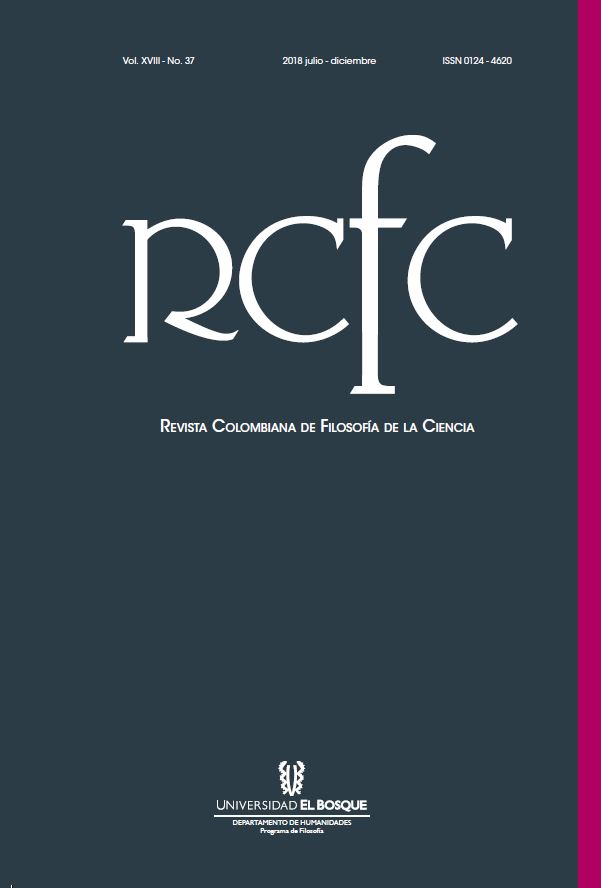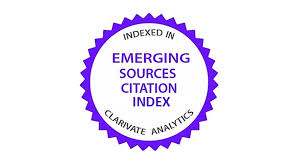Análisis de las contribuciones y de los sentidos de la epistemología histórica
DOI:
https://doi.org/10.18270/rcfc.v18i37.2573Palabras clave:
historia de la ciencia, historia de la ciencia, epistemología, epistemología, historia de la epistemología, historia de la epistemología, filosofía de la ciencia, filosofía de la cienciaResumen
En este texto se analiza la relevancia teórica de la reciente perspectiva designada como “epistemología histórica”, en relación con la perspectiva similar de la historia de la epistemología. En contraste con el punto de vista planteado por Sturm, se revisan y discuten los cuestionamientos a los aportes epistemológicos de los análisis de las prácticas investigativas, realizados por los estudios de la epistemología histórica. Como punto de partida para el análisis de estos aspectos, se especifican el origen y el significado de la epistemología histórica, y se definen los principales sentidos en los que se ha desarrollado esta perspectiva, sus aportes, sus principales limitaciones y sus críticas.
Descargas
Referencias bibliográficas
Becerra B. M. “La cuestión de la Epistemología Histórica como estilo epistemológico”. Epistemología e Historia de la Ciencia 1.1 (2016): 35-52
Braunstein, J. F. “Historical Epistemology. Old and New”. Conference Epistemology and History. From Bachelard and Canguilhem to Today’s History of Science. Berlin: Max Planck Institute für Wissenschaftsgeschichte (Preprint 434), 2012. 33-40.
Canguilhem, G. Wissenschaft, Technik, Leben: Beitra¨ge zur historischen Epistemologie. Berlin: Merve, 2006.
Chandler J., Davidson A. y Harootunian H. Questions of Evidence: Proof, Practice, and Persuasion across the Disciplines. Chicago: The University of Chicago Press, 1994.
Chimisso, C. “The Tribunal of Philosophy and its Norms: History and Philosophy in Georges Canguilhem’s Historical Epistemology”. Studies in the History and Philosophy of Biological and Biomedical Sciences 34 (2003): 297–327.
Daston, L. y Galison, P. Objectivity. New York: Zone Books, 2007.
Daston, L y Lunbeck, E. Histories of Scientific Observation. Chicago: University of Chicago Press, 2011.
Daston, L. “Objectivity and the Escape from Perspective”. Social Studies of Science. 22.4 (1991): 597-618.
_________. Classical Probability in the Enlightenment. Princeton: Princeton University Press, 1988.
_________. Biographies of Scientific Objects. Chicago: University of Chicago Press, 2000
_________. “On Scientific Observation”. Isis 99.1 (2008): 97-110.
Davidson, A. I. The emergence of sexuality: Historical epistemology and the formation of concepts. Cambridge: Harvard University Press, 2002.
Feest, U. y Sturm, T. “What (Good) is Historical Epistemology? Editor’s Introduction”. Erkenn 75 (2011): 285–302.
Fragio, A. “De Davos a Cerisy-La-Salle: La epistemología histórica en el contexto europeo”. Tesis de doctorado Universidad Autónoma de Madrid. Facultad de Filosofía y Letras, 2007.
Gingras, Y. “Naming without necessity: On the Genealogy and Uses of the Label « historical epistemology »”. Revue de synthèse. 131.3 (2010): 439-454.
Goldman, A. Epistemology and Cognition. Cambridge, MA: Harvard University Press, 1986.
Hacking, I. Representing and Intervening. Cambridge: University Press, 1983.
Hyder, D. “Foucault, Cavaille`s, and Husserl on the Historical Epistemology of the Sciences”. Perspectives on Science 11.1 (2003): 107-129.
Krüger, L., Daston, L., y Heidelberger, M. (Eds.). The probabilistic Revolution. Ideas in History 1.1. Cambridge, MA: MIT Press, 1987a.
_________. Gigerenzer, G., y Morgan, M. (Eds.) The Probabilistic Revolution. Ideas in the Sciences 2.1. Cambridge, MA: MIT Press, 1987b.
Latour, B. Science in Action: How to Follow Scientists and Engineers through Society. Cambridge, Massachusetts: Harvard University Press, 1987.
Lecourt, D. L’Episte´mologie historique de Gaston Bachelard. Paris: Vrin, 1969.
Martínez, S. F. y Esteban, José M. Normas y prácticas en la ciencia. México: IIFS-UNAM, 1a. ed., 2008.
Martínez, S. F. y Xiang Huang. Hacia una filosofía de la ciencia centrada en prácticas. México: Bonilla Arias Editores y UNAM, 2015.
Renn, J. “Historical Epistemology and Interdisciplinarity”. Physics, Philosophy and the Scientific Community. Eds. Kostas. Gavroglu, et al. Dordrecht: Kluwer, 1995. 241-251.
_________. Historical Epistemology and the Advancement of Science. Max Planck Institute for the History of Science: Preprint Series 36. Berlin: Max Planck Institute for the History of Science, 1996. <http://www.mpiwg-berlin.mpg.de/Preprints/P36.PDF>
_________. “The Relativity Revolution from the Perspective of Historical Epistemology”. Isis 95.4 (2004): 640-648.
_________. The Historical Epistemology of Mechanics. Foreword to Matthias Schemmel, The English Galileo. Thomas Harriot’s Work on Motion as an Example of Preclassical Mechanics. Dordrecht: Springer, 2008. vii–x.
Rheinberger, H. J. Toward a History of Epistemic Things. Synthesizing Proteins in the Test Tube. Stanford: Stanford University Press, 1997.
_________. “Gaston Bachelard and the Notion of « Phenomenotechnique»”. Perspectives on Science 13.1 (2005a): 313–328.
_________. “Reassessing the Historical Epistemology of Georges Canguilhem”. Continental Philosophy of Science. Ed. C. Gutting. Oxford: Blackwell, 2005b. 187–197.
_________. On historicizing epistemology. An essay. Stanford: Stanford University Press, 2010.
Rouse, Joseph, Engaging Science: How to Understand Its Practices Philosophically Ithaca: Cornell University Press, 1996.
_________. “Understanding Scientific Practices: Cultural Studies of Science as a Philosophical Program”. The Science Studies Reader. Ed. Biagioli, Mario. London: Routledge, 1999. 442–456.
_________. How Scientific Practices Matter: Reclaiming Philosophical Naturalism Chicago: University of Chicago Press, 2002.
Tiles, M. Bachelard: Science and objectivity. Cambridge: Cambridge University Press, 1984.
_________. “Epistemological History: The Legacy of Bachelard and Canguilhem”. Contemporary French Philosophy. Ed. A. Phillips Griffiths. Cambridge: Cambridge University Press, 1987. 141–156
Sturm, T. “Historical Epistemology or History of Epistemology? The Case of the Relation Between Perception and Judgment”. Erkenn 75.3 (2011): 303–324.
Wartofsky, M. “The Mind’s Eye and the Hand’s Brain: Toward an Historical Epistemology of Medicine”. Science, Ethics, and Medicine. Eds. Engelhardt, H. T. y Daniel Callahan. New York: University Publications of America, 1976. 167-194.
_________. “From Genetic Epistemology to Historical Epistemology: Kant, Marx, and Piaget”. Piaget and the Foundations of Knowledge. Ed. Liben, Lynn S. Hillsdale, NJ: Erlbaum, 1983a. 1–18.
_________. “The Child’s Construction of the World and the World’s Construction of the Child: From Historical Epistemology to Historical Psychology”. The Child and Other Cultural Inventions. Eds. Kessel, Frank S. y Alexander W. New York: Praeger, 1983b. 1-18.
_________. “Epistemology historicized ”. Naturalistic Epistemology. Eds. Shimony, Abner y Debra Nails. Dordrecht: Reidel, 1987. 357-374.











